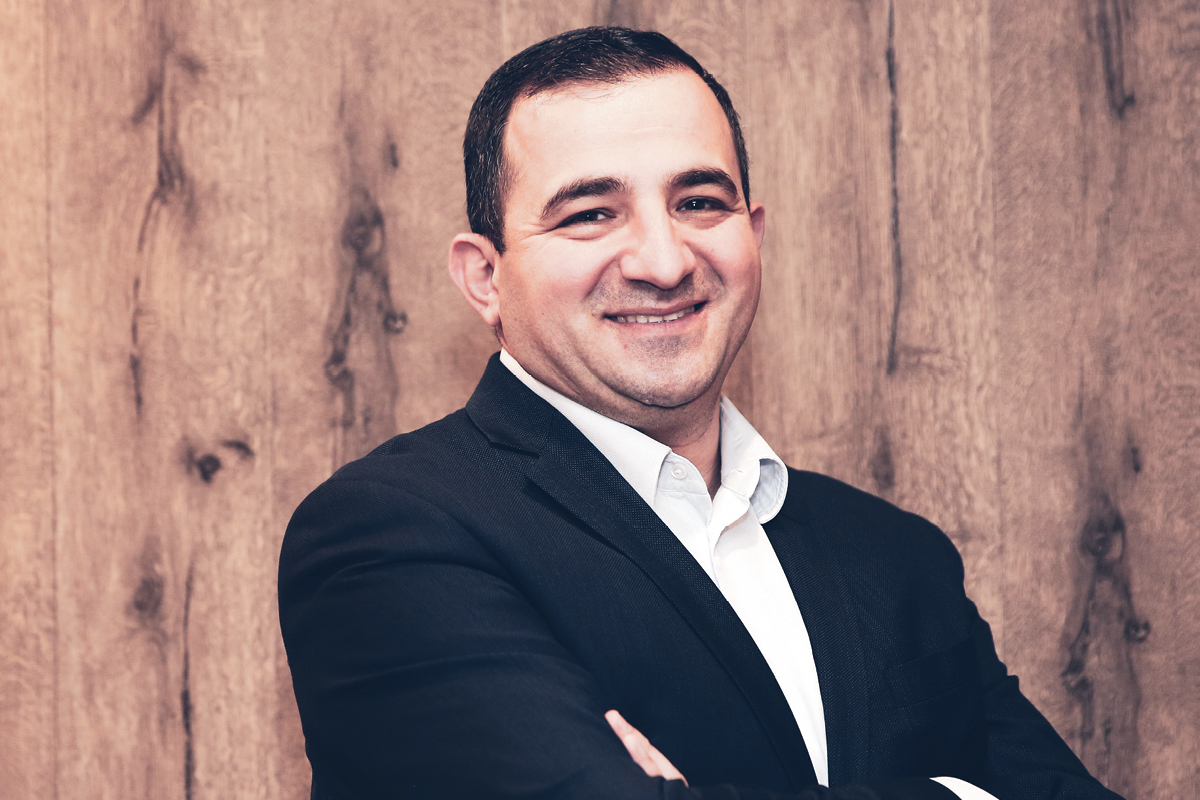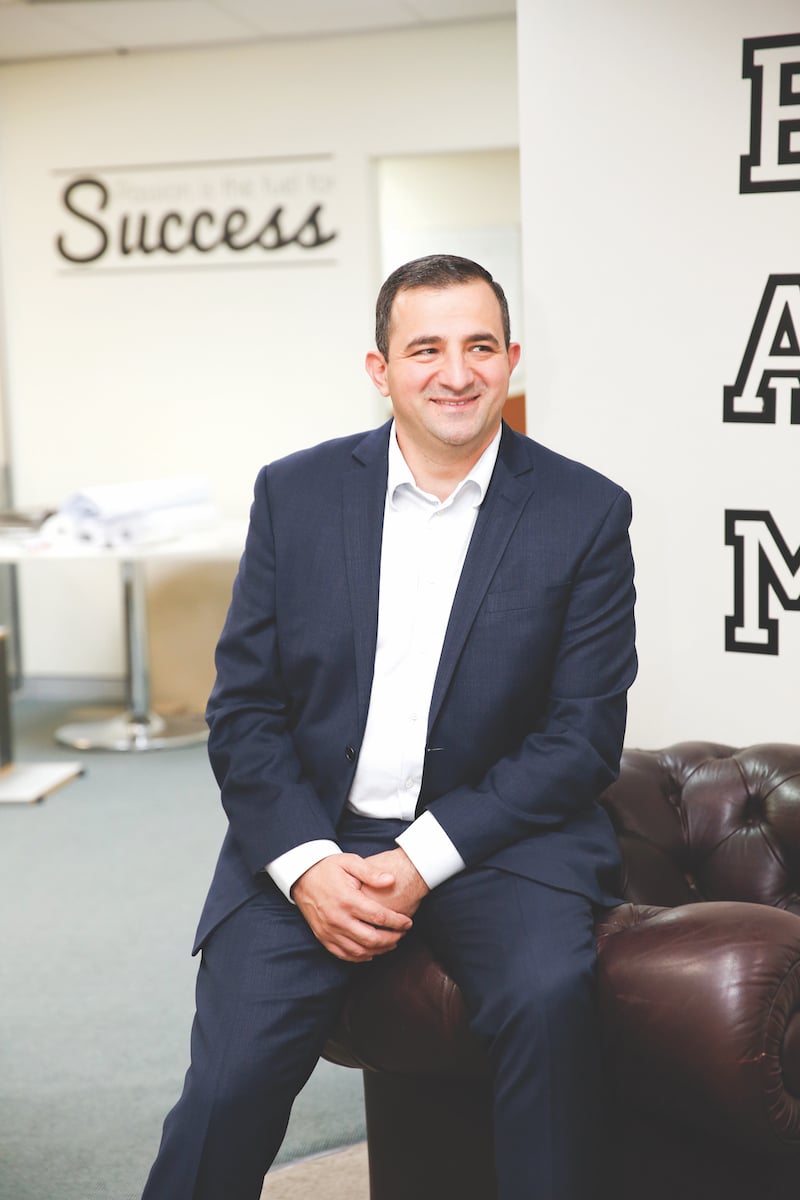Building value: Sam El Rihani
Founder and Managing Director of Decode Group Sam El Rihani only pursues development projects that add value – whether that value goes to the market, employees or customers.
Whether it’s in business or in life, sometimes things don’t work out the way you hope. In such situations, the capacity to adapt is crucial. In the world of business, this is the true mark of an entrepreneur; markets and customers fluctuate and shift, and failure to adjust can cost one’s enterprise dearly.

Sam El Rihani, Founder and Managing Director of construction firm Decode Group, wouldn’t have ended up in Australia if things had gone differently. After graduating with a degree in Structural Engineering in Lebanon, he hoped to continue his studies in the US.
Unfortunately, the year was 2001; the world – the US in particular – was thrown into chaos, and Sam wasn’t granted a visa. Fate, therefore, found him studying and eventually working in engineering, here in Australia.
Living in a country that many people admire for its multiculturalism, Sam has likewise embraced diversity within Decode. He sees Australia as one of the few countries where it’s possible to bring together a variety of multicultural backgrounds in pursuit of common goals and dreams.
A key requirement of being a member of the Decode team, says Sam, is the right attitude and not just qualifications; passion and drive are valued over all else. "We create opportunities for people and give them the space to thrive," he says.
"We create opportunities for people and give them the space to thrive."
"We make sure they can fulfil their role and maintain passion for their career. I share the vision and operations of the business with them. Usually, when we talk through that together, it really motivates people."
Given Decode’s history of growth and transformation, the team probably doesn’t find it too hard to maintain that engagement. The company’s origins go back to 2008, after Sam turned down a scholarship to study for a PhD at the University of Wollongong, instead choosing to join the workforce.
He started his construction business in 2008 and rebranded as the sole founder and owner of the Decode Group of companies in 2015.

The effort to reach this point was a gradual process, says Sam, but patience and commitment eventually resulted in Decode reaching its current heights of success. "We started with smaller projects," he recalls.
"And took on bigger projects as our capability grew. It’s all been about these stepping-stone projects."
At present, Sydney’s property market is under some pressure, with the looming market downturn; Decode has 14 residential property projects currently underway.
But like all entrepreneurs, Sam doesn’t see such circumstances as challenges, but as opportunities. He has taken the opportunity to significantly diversify Decode’s operations, focusing on commercial, industrial, healthcare, retail, hospitality, education and government projects.
Decode’s projects are all testament to the capability and experience that the company’s team brings to the table. Despite the residential decline, Decode’s record in the market remains impressive.
It has constructed 2,100 units, and has 13 live projects across Sydney. The company’s accomplishments have been recognised by a first-place ranking in the construction industry on the 2018 Australian Financial Review’s Fast 100 list, thanks to a revenue of nearly A$140 million and a three-year average growth rate of almost 150%.
Decode practises diversity in more than just the kinds of projects it takes on; the company is also involved with every stage of the property development process (Decode stands for design, construct and develop).
The company’s 100-plus staff bring an impressive range of skills and experience together to work for clients. The first stage of the process, says Sam, is meeting with the client, to collaboratively establish the expectations for the project.
Unrealistic expectations should be adjusted and, in some cases, Decode helps clients determine what exactly they want, by defining their vision in concrete terms.
Sam believes this dialogue is something that persists through the entire process."Go back to expectations – what is expected from you and what you expect from them," he says.
"You need to set expectations right from the beginning and make sure you exceed those expectations. That requires you to maintain regular communication in every aspect and that’s the way to satisfy your client. If at any point in time you are unable to meet expectations, you need to communicate that before it happens, to reset those expectations.
"One challenge is how you maintain quality to meet expectations. You have to build a system for this. We don’t believe in appraising the quality of the project only after it’s finished. Instead, we check the quality throughout the execution of the project. We’ve built systems and procedures, so that inspection can be done by any party who understands the project and what we need to achieve. There are inspections and certifications in place to facilitate that. It’s a similar thing with safety. There must be inspections to be sure that the site is safe and clean at all times."
Sam maintains a strong commitment to making his client feel respected; as another nod to his passion for diversity, he knows a little of many languages. It shows respect to clients’ cultures and is an assurance that he will go above and beyond in making them feel comfortable.
Transparency is also an important strategy; clients are invited to visit Decode’s office any time and access information on projects whenever they need.
This honesty extends to a pragmatic approach to business; although Decode might not always get it right, the team always makes the effort, and doesn’t pretend otherwise. "We always try to do the best we can," Sam says.
Sam studied structural engineering in Lebanon, before undertaking a Master’s in the same field at UNSW Sydney, eventually working for some time as a structural design engineer.His philosophy of design, therefore, places emphasis on "value engineering", a systematic process that ensures a careful balance of cost and function. The aim is to produce an end product that is neither over-designed nor underperforming. "It’s not just about time and cost, it’s also about quality and safety," Sam explains. "Make sure the development methodology is correct. The cost is a reflection of the efficiency of the design."
"We don’t shy away from our mistakes. We don’t hide from them. We acknowledge our mistakes because we’re responsible for them. This is our philosophy. From that perspective, every project we take on, we must do the best we can.
"Don’t run away from your responsibilities. Face your errors, fix them and move on. Make sure everything is working as well as it possibly can. Spend all the energy you have to do the best you can. It doesn’t matter who you are, or how people perceive you. Sometimes when doing the best isn’t good enough, that’s fine. You just make sure next time is better."
"Spend all the energy you have to do the bestyou can. It doesn’t matter who you are, or how people perceive you."
This commitment to being better is essential for a company like Decode; particularly in regard to residential construction projects, Sam believes the firm’s work improves quality of life for many.
When asked which project he’s most proud of, he says Decode takes pride in all of them, regardless of size. It’s down to the simple fact that the company only takes on the projects that matter to society.
"We only build projects that add value to people’s lives," says Sam. "Some people believe that if you’re not comfortable in the place where you live, you need to spend more energy to accommodate yourself to it. So we make sure any space we build, makes people happy."
Equally empowering is Decode’s approach to its team. Sam’s strategy is to provide opportunities and a platform to those passionate enough to thrive in construction and development.
The firm abstains from politics in favour of uplifting anyone capable of creating results. "What the market requires is competitive price, good quality, efficient layout," he says.
"We achieve this is by relying on capabilities and creating a framework, and getting the teams to combine all that knowledge into a project. I help them and the process is carried out to achieve these market requirements. That teamwork becomes part of the values we hold."
Proudly supported by: